Issue 55 : 17 May 2020
Talofa Lava, Kia Orana, Malo E Leilei, Tena Koutou, Hello ...
... and welcome to the latest issue of “For The Love Of The Game”, the official e-zine of the New Zealand Amateur Sport Association Inc. We hope you enjoy reading the articles below.
If you have any feedback on this issue, ideas for future articles, or would like to contact the Editor, please click here. And, you are invited to forward the e-zine to others you know, who may be interested in reading it.
Over the past fortnight, the Association has been active in advocating for community sport support from local authorities throughout New Zealand, with an update provided on steps being taken by some Councils, below. The Association welcomes your feedback and ideas, as it continues to advocate on behalf of organised amateur sport thoughout New Zealand.
If you are interested in applying for membership of the Association, please click here.
Annual General Meeting – 26 May, 2020 – Reminder ...
The fourth Annual General Meeting of the Association will be held on Tuesday, 26 May 2020 at 5.30pm, at the Wellesley Boutique Hotel, Wellesley Street, Wellington. A copy of the Agenda can be obtained by clicking here. If you are intending to attend the meeting, please click here.
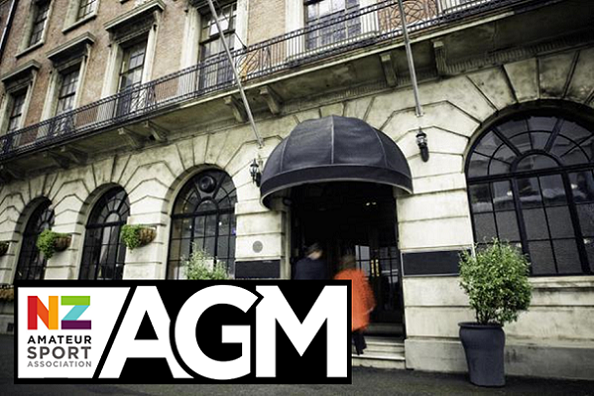
Government Announces New Relief Package For Sport ...
Earlier today, the Government announced that over the next four years (pending the outcome of the 2020 election), it will invest in three areas: $83 million in short-term support to help sport and recreation organisations at all levels to get through the initial impact of COVID-19; $104 million to help the sector re-build in the medium term, including so national and regional sports organisations can make changes in order to operate successfully in the post-pandemic environment; and $78 million for innovative approaches to delivering play, active recreation and sport into the future. A whopping $265 million in total.
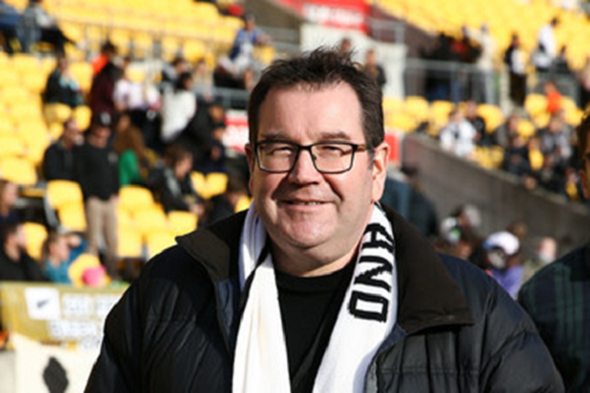
(Grant Robertson, Minister for Sport and Recreation, has pledged $265 million to sport)
The package represents a material investment in sport, which this Association welcomes, as will all sportspeople and sporting communities throughout New Zealand. Of course, there will be a need to ensure that financial relief finds its way quickly and effectively to those who need it most (as referred to below), while future reform and innovation must involve all of sports stake-holders, "from the grassroots up".
A Quarter Of Local Authorities Are Waiving Community Sport Club Fees ...
Last week, Association President Andy Leslie wrote to the Mayors and Chief Executives of New Zealand’s 67 City and District Councils requesting their consideration of financial relief for community sport organisations in their regions, in support of the social-good which arises from community sport in New Zealand. The letter was also sent to the 71 electorate Members of Parliament who represent these local authorities.
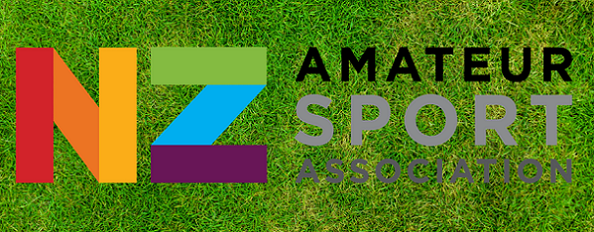
Of responses received, a quarter have confirmed that they are currently providing relief from rates, rents or user-charges for up to a year for sport organisations in their regions, with the Masterton District Council (for example) providing rent relief for 12 months from 26 March, noting that, “the current and social economic environment will likely have a long-term effect on local sport and sport facilities”. Similarly, the Western Bay of Plenty District Council recognises that the pandemic has meant that many across its communities, including local community sport organisations, are going through tough times, and “is waiving annual rent charges for Council owned reserves and buildings for 12 months for sport clubs and community organisations”.
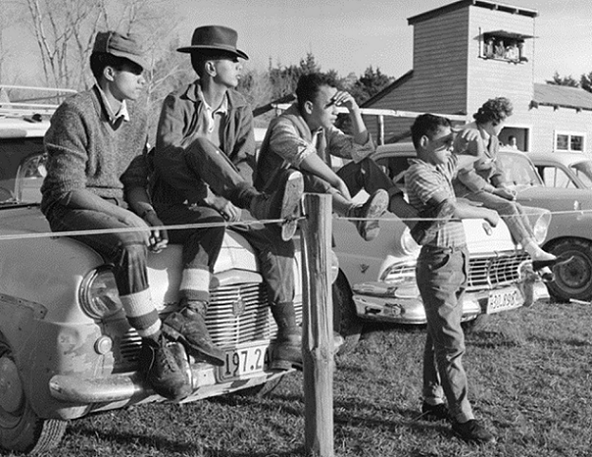
(Council-owned grounds and facilities are an essential component of community sport)
The Association hopes that other Councils will adopt a similar approach across the country, as a practical way of ensuring that organisations which utilise rate-payer funded assets, for the benefit of rate-payers, are able to survive the unfolding financial crisis affecting amateur sport.
Kids Will Suffer Most From Sport’s COVID-19 Economic Shock ...
With New Zealand’s Treasury forecasting unemployment in this country to reach 9.8 per cent by September this year, the financial impact for many households will be severe, with spending on discretionary items (such as sport club subscriptions) unlikely to be possible for many families.

According to the Treasury's main Budget 2020 forecast, unemployment will not return to pre-COVID levels until at least 2024, meaning many children may not have access to organised community sport for some years. Association Member, the Wellington City Mission, which has experienced a 500 per cent increase in food parcels and has supplied over 6,000 frozen meals within four weeks, notes that it has received “a number of calls from parents who are asking if there is any relief with funding to cover the cost of [sport] subscriptions/fees. Their children are looking forward to sport starting. However, they do not have the funds to cover the cost.”
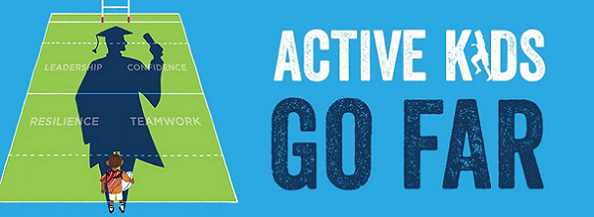
Families require "bottom-up financial support" to enable their kids to play sport. This Association has previously promoted the voucher-system in place across Australia, which enables low-income families to participate in their local club communities. The “Active Kids” programme provides two $100 vouchers for parents, guardians and carers of school-enrolled children to use towards sport and active recreation costs each year. New Zealand needs a similar scheme, now.
Viewpoint : Pandemic Provides Perspective ...
In recent years, the distinction between “professional” and “amateur” sport has become increasingly blurred, with professional games (of all codes) unashamedly monetising amateur values for commercial purposes. However the COVID-19 pandemic has now helpfully drawn a clear line-in-the-sand between professional and amateur sport. Recent legislation has defined “professional sports clubs” as work-places providing employment, while “amateur sports clubs” are considered (by law) to provide community recreation, for social-purposes.

More specifically, the Government’s "COVID-19 Public Health Response (Alert Level 2) Order 2020" has now brought the blurred-lines between professional and amateur into sharp focus, with “the Order” by statute defining "businesses and services" as (among other things), "the playing of sports professionally or semi-professionally". "Voluntary or not-for-profit sporting, recreational, social, or cultural activities" are specifically excluded from the freedoms to operate enabled by the Order. In essence this means that community sport is solely “for the love of the game” and not considered an arena for paid-employment of sports people.
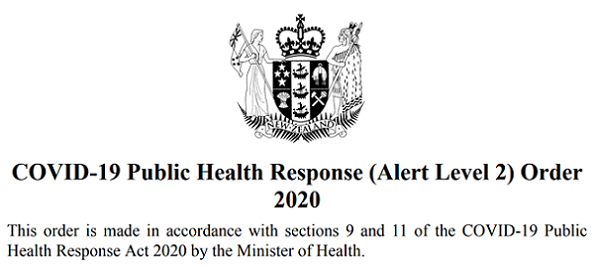
$84 Million In Pandemic Relief For Canadian Amateur Sport ...
Canada’s federal government has announced C$72 million in funding which will be available to national and provincial sport organisations, Canadian sport institutes and indigenous sport groups. Professional teams and leagues are not eligible for the funding. That translates to a top-up of roughly half a million dollars for Gymnastics Canada, which last week laid off 70 per cent of its staff. It’s estimated that Gymnastics Canada will lose between $1 million and $1.5 million in membership fees this year because of the pandemic.

In announcing the package, Canada’s Federal Heritage Minister Steven Guilbeault said, "we will try to save all our organisations and to help everybody. We may not be able to, but we will try. What we're hoping to achieve out of this is once we've gone through that first phase of the crisis, our sports ecosystem is still intact."
The Fight For Rugby's Future ...
In a three-part series looking at the future of rugby in a post-pandemic world, the "New Zealand Herald" today looked at the present and future shape of the sport at community level. Dylan Cleaver writes, "It is, in essence, a debate about what club and community sport should look like and what its role in the sport's ecosystem is." Looking at school and club rugby nationally, the article concludes that "in community rugby, the ends just do not justify the means."
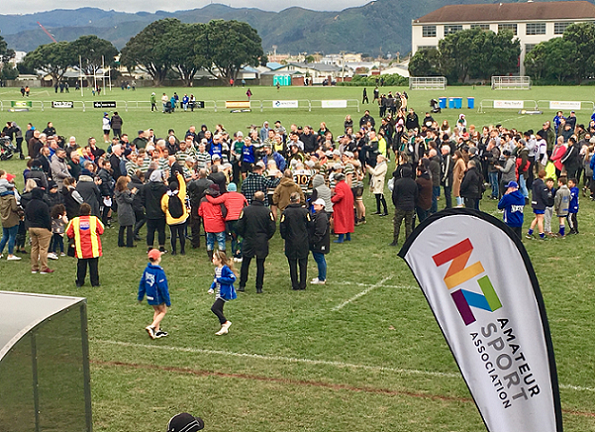
You can read more, by clicking here.
From The Archives ...
YACHT RACING
OTAGO DAILY TIMES, ISSUE 26364, 20 JANUARY 1947
NEES MEMORIAL CUP RECORD NUMBER OF STARTERS
“Forty-four yachts, the largest number ever to compete in a yacht race on the Otago Harbour, faced the starter for the H. F. Nees Memorial Cup Race on Saturday afternoon. The wind was light and variable, and the course, which started at the boat harbour, led around the three legs and down the eastern channel, all piles being passed to port, and finished over a line near the Broad Bay wharf. Jade was first away, the other smaller craft leaving at various intervals under the Mark Foy system. By the time the 14-footers and the keelers began, the wind had veered several points, and the late starters could not carry their spinnakers to reduce the advantage gained by the earlier starters.
The race from this stage developed into a procession, and it was only necessary for the limit boats to be sailed through the water and take full advantage of their handicaps to retain the leading positions. Taiona kept the lead until the finishing line, to win the 1947 Nees Cup.”
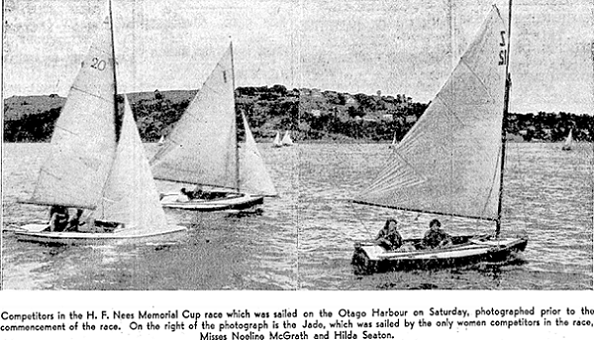
The "H F Nees Memorial Cup" was first competed for in January 1930, as a cruising race from the Port Chalmers Boat Harbour up to the “three legs beacon” and down the eastern Peninsula Channel to Broad Bay. In 1931, 21 yachts representing every club in the harbour competed. In 1945, a record 45 boats competed, the biggest yacht race in the history of the harbour.
Henry Frederick (Harry) Nees, who was Commodore of the Otago Yacht Club from 1903-1906, was the son of German immigrant gold-prospector and cabinet-maker, Heinrich Friedrich Wilhelm Neess, (who later anglicised his name to “Nees”). An “enthusiastic yachtsman”, in the 1880’s Harry Nees with several other Otago gentlemen built the yacht “Muritai”, described as “a beamy cutter, about 40 foot overall”, which registered many racing victories against other well-known sailing vessels.
In the early 1900’s, yachting was one of New Zealand’s more socially-progressive sports, with clubs promoting membership of women to “popularise the sport” by providing “races for yachts steered by ladies”, with an expansion to ladies’ motor-boat racing in the 1920’s.
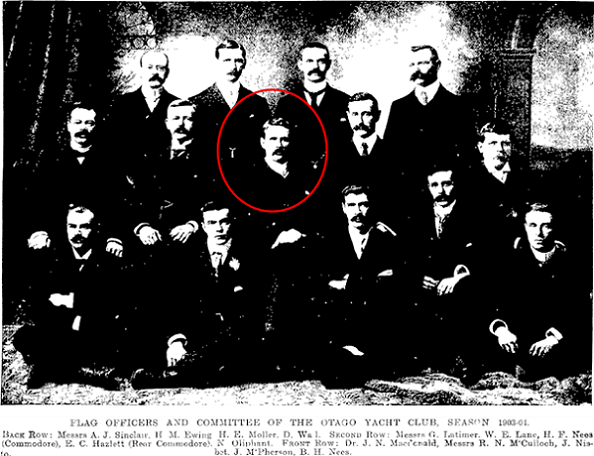
(Harry Nees, circled, as Commodore of the Otago Yacht Club, in 1903)
After serving his time in his father’s furniture factory, Harry Nees went to Australia, and on his return worked as a contractor, building several churches in the Dunedin area. He then took up dredge building, and built many famous dredges during the gold dredging boom, at one time becoming Chairman of Directors of the Unity Gold, Island Block and Dunstan Lead dredging companies. When the gold-boom “bust”, he went into business as an active member of the firm of Nees and Co., which was the New Zealand agent for the Lozier Oil Engine Company (manufacturing marine engines) on Great King Street in Dunedin. He donated his money and time to the building of the Otago Yacht Club’s premises and slipway, as a Trustee of the Club.
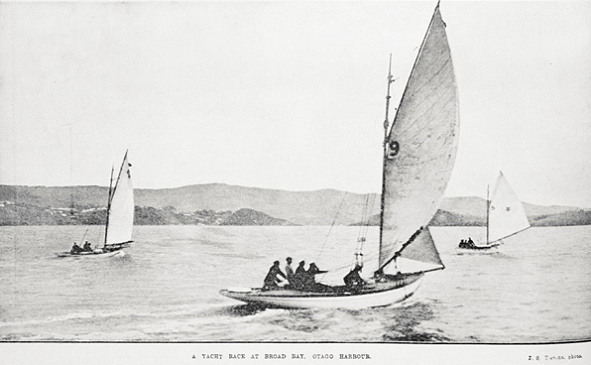
An ex-president of the Orphans’ Club and of the Commercial Travellers and Warehousemen’s Association, Nees was also known as an “enthusiastic amateur gardener”. A bachelor all his life, he died aged 63, in 1929. The Otago Yacht and Motor Club instituted the "H F Nees Memorial Cup" for yachts in the year following his death, “to keep his memory, green”.
The Final Word ...
"The best time to plant a tree was 25 years ago. The second-best time, is today."
(Eliud Kipchoge, World Record Holder, Marathon)